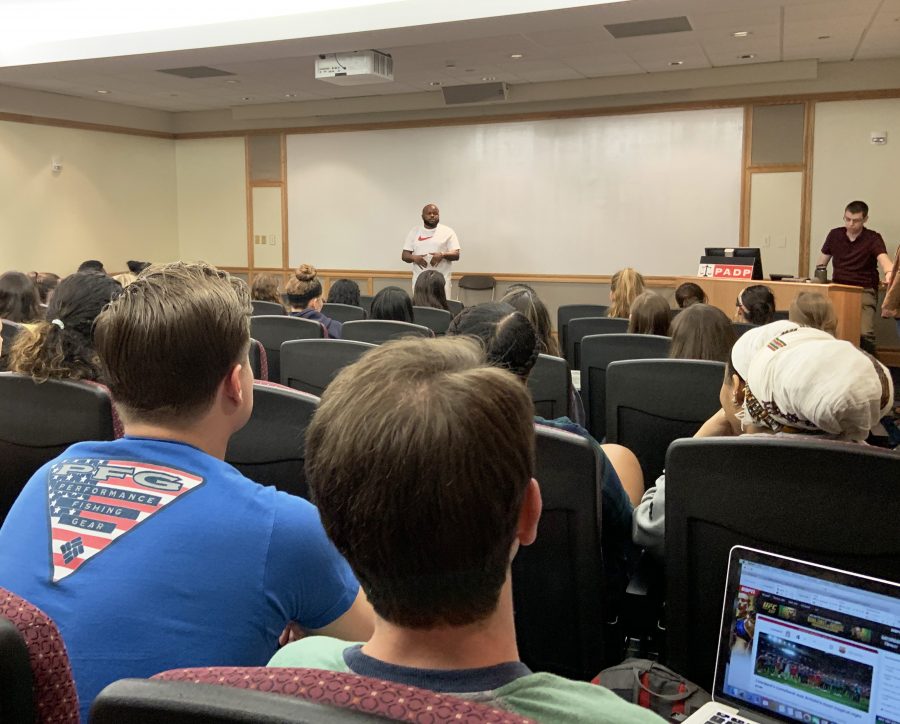Jimmy Dennis fights for the rights of men and women who have been wrongfully incarcerated throughout the United States.
He did not pick this cause randomly: Dennis spent almost 26 years in prison for a crime he did not commit.
Dennis spoke at the college on Tuesday, almost two years after returning home from prison.
When Dennis was 21 years old in 1991, he was wrongfully accused of murder due to falsified evidence and actions by corrupt law enforcement.
After being put on a trial for over a month, he was found guilty. Later, he received the death penalty.
Less than a week after being taken to prison, his daughter was born.
Police officers and prosecutors claimed to have “lost” clothing they originally said were Dennis’, that had actually been taken from three different locations. The clothes lacked Dennis’s DNA and therefore could have proven his innocence.
While the crime was committed by at least two people, Dennis was the only person ever convicted. A witness statement proving his innocence was kept hidden for over 15 years. Statements by other people confessing to the crime were hidden as well.
In 2013, US district judge Anita Brody threw out Dennis’ conviction with a 46-page decision discussing the facts of the case and the corrupt actions of the police officers and prosecutors. Even then, however, he remained in prison for four more years.
It wasn’t until the full US Court of Appeals for the Third Circuit upheld the overturning of Dennis’ conviction in 2016 that he finally went home on May 13, 2017.
“That was a day that I’ll never forget,” Dennis said.
In his long incarceration, Dennis credited his belief in God and his love of music for getting him through.
Every morning, Dennis said he would wake up saying, “Thank you Lord for giving me another day.” After praying, he would get to work.
Dennis essentially turned his cell into a library, working every day on his “Justice for Jimmy” campaign, where he wrote letters and spoke to lawyers over the phone, advocating for his innocence.
In every letter he wrote, he inscribed “praying for the truth” inside the envelope.
“I would think positive all the time. I knew that I would have my day of truth one day. I held on to it,” Dennis said.
Dennis encouraged students in the audience to pay attention to who they are voting into office, such as judges and prosecutors. This way, he said, “[we can] tip the balance back in our favor.”
Dennis said he also strongly believes in abolishing the death penalty to reduce the risk of killing an innocent person.
Former Lafayette student Andrew Keck ‘16, who works to abolish the death penalty, spoke at the event after Dennis.
Keck, currently a Project Coordinator at Pennsylvanians for Alternatives to the Death Penalty, became involved in Dennis’s case before graduating. Upon realizing he did not have a direct idea of what to do upon graduating, he began to get involved with human rights issues, notably the death penalty.
In the summer of 2016, he embarked on a letter-writing campaign, ultimately getting Dennis’ story of innocence published in the five biggest media markets in the state.
As he worked, Dennis’s case became more surreal for him to comprehend.
“It is so blatantly obvious that this is an innocent man on death row, and it’s my elected officials who put him there,” Keck said.
Keck encouraged students to think about what they can do make their community “a little bit better than it was yesterday.”
“It’s not always obvious what cause you’re going to fight for,” Keck said.
Emilie Henry ‘19 became involved with Dennis’s case in the summer of 2016 when she interned for Pennsylvania for Alternatives to the Death Penalty after her freshman year. She worked with Keck to write letters on behalf of Dennis.
“We were just students, and you guys can do the exact same thing for people like [Dennis],” Henry said.
Henry is currently one of the presidents of Lafayette’s chapter of Amnesty International, an organization promoting human rights. She was involved in getting Dennis to speak at the college.
“I’m incredibly grateful to have [Dennis] here,” Henry said later at an interview. “His story has got to be the most compelling evidence for death penalty abolition that I’ve ever encountered. Having him here is a little surreal for me, but I’m so grateful.”
Dennis is still getting acclimated into the world outside prison, he said.
As he tries to figure out the new technological developments and social media, he suffers from PTSD and panic and anxiety attacks. Dennis said that when he hears sirens or sees police officers, he believes they are coming to “steal [his] life.”
On April 30, Dennis went to the state capital in Harrisburg to advocate for a bill that would abolish the death penalty in Pennsylvania for State Representative Chris Rabb.
A lifelong lover of music, Dennis is finally pursuing his dream of sharing his music. His song “You Said” is currently available on iTunes and other streaming sources. He has a new EP on its way in June.
“Be looking for that,” Dennis said with a smile.



























































































































